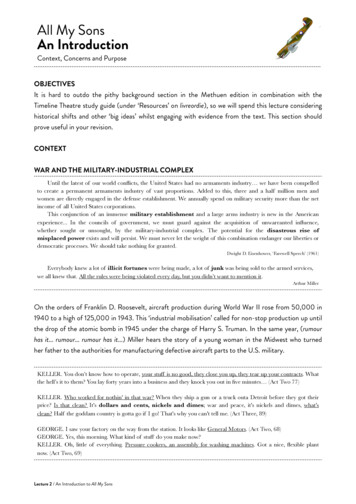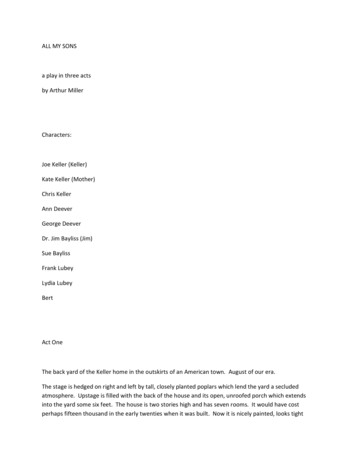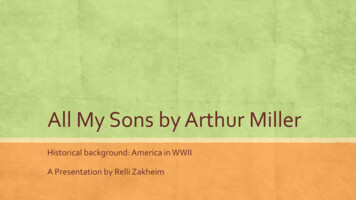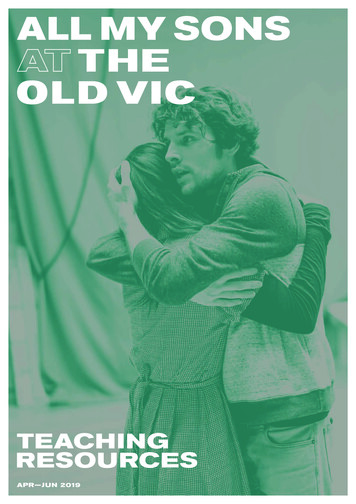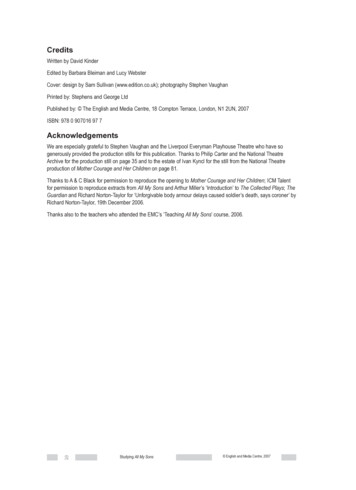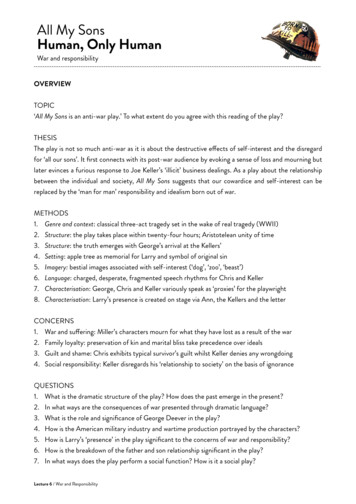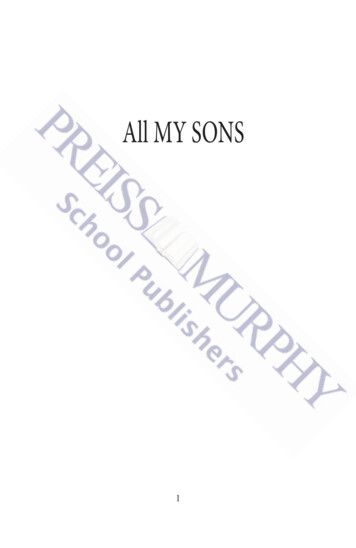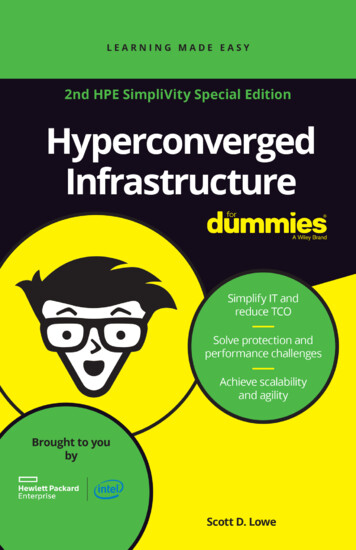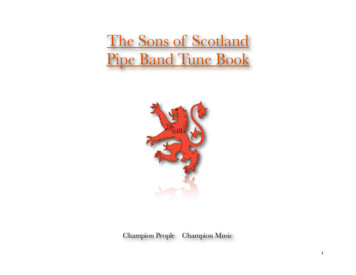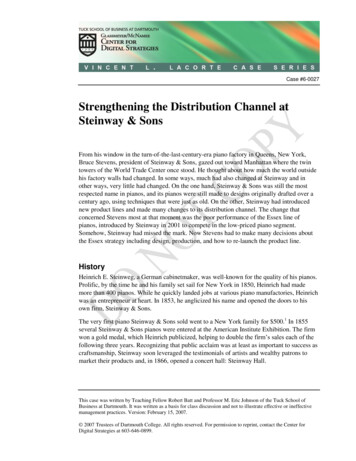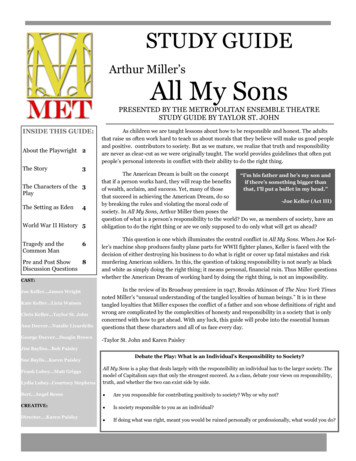
Transcription
STUDY GUIDEArthur Miller‘sAll My SonsPRESENTED BY THE METROPOLITAN ENSEMBLE THEATRESTUDY GUIDE BY TAYLOR ST. JOHNINSIDE THIS GUIDE:About the Playwright 2The Story3The Characters of the 3PlayThe Setting as Eden4World War II History 5Tragedy and theCommon Man6Pre and Post Show8Discussion QuestionsCAST:Joe Keller James WrightKate Keller Licia WatsonChris Keller.Taylor St. JohnAnn Deever Natalie LicardelloGeorge Deever Doogin BrownAs children we are taught lessons about how to be responsible and honest. The adultsthat raise us often work hard to teach us about morals that they believe will make us good peopleand positive. contributors to society. But as we mature, we realize that truth and responsibilityare never as clear-cut as we were originally taught. The world provides guidelines that often putpeople‘s personal interests in conflict with their ability to do the right thing.The American Dream is built on the concept“I’m his father and he’s my son andthat if a person works hard, they will reap the benefitsif there’s something bigger thanthat, I’ll put a bullet in my head.”of wealth, acclaim, and success. Yet, many of thosethat succeed in achieving the American Dream, do so-Joe Keller (Act III)by breaking the rules and violating the moral code ofsociety. In All My Sons, Arthur Miller then poses thequestion of what is a person‘s responsibility to the world? Do we, as members of society, have anobligation to do the right thing or are we only supposed to do only what will get us ahead?This question is one which illuminates the central conflict in All My Sons. When Joe Keller‘s machine shop produces faulty plane parts for WWII fighter planes, Keller is faced with thedecision of either destroying his business to do what is right or cover up fatal mistakes and riskmurdering American soldiers. In this, the question of taking responsibility is not nearly as blackand white as simply doing the right thing; it means personal, financial ruin. Thus Miller questionswhether the American Dream of working hard by doing the right thing, is not an impossibility.In the review of its Broadway premiere in 1947, Brooks Atkinson of The New York Timesnoted Miller‘s ―unusual understanding of the tangled loyalties of human beings.‖ It is in thesetangled loyalties that Miller exposes the conflict of a father and son whose definitions of right andwrong are complicated by the complexities of honesty and responsibility in a society that is onlyconcerned with how to get ahead. With any luck, this guide will probe into the essential humanquestions that these characters and all of us face every day.-Taylor St. John and Karen PaisleyJim Bayliss Bob PaisleyDebate the Play: What is an Individual’s Responsibility to Society?Sue Baylis Karen PaisleyLydia Lubey.Courtney StephensAll My Sons is a play that deals largely with the responsibility an individual has to the larger society. Themodel of Capitalism says that only the strongest succeed. As a class, debate your views on responsibility,truth, and whether the two can exist side by side.Bert.Angel Reese Are you responsible for contributing positively to society? Why or why not?CREATIVE: Is society responsible to you as an individual?Director .Karen Paisley If doing what was right, meant you would be ruined personally or professionally, what would you do?Frank Lubey Matt Griggs
ABOUT THE PLAYWRIGHT: ARTHUR MILLER 1915-2005Arthur Miller has long been considered one of America‘s greatestplaywrights. His plays make a harsh critique of the American conscious andexposes the delusions of the American Dream. For Miller, plays function toshed light on corruption and encourage political dialogue about the affairs ofthe day. As he says in his own words, ―I can almost tell what the political situation in a country is when the play is suddenly a hit there. It is either awarning of tyranny on the way or a reminder of tyranny just past.‖Miller‘s politics have always played a large role in his playwriting. Hegrew up in New York City during the Great Depression when the financialcrash destroyed his father‘s garment business. His father‘s financial disasterinforms his extreme skepticism in America‘s political and economic system.Thus his plays (Death of a Salesman and AllMy Sons) function as critiques of the American Dream.Far from the American Dream was his personal life which was as deeplytroubled as the lives of the characters he wrote about. In 1956, he married thefamous sex symbol Marilyn Monroe. During their four years of marriage, Millerstopped writing to attend to Monroe who was ―increasingly tormented by personal demons and drug abuse‖ (The New York Times). He would later document hismarriage with Monroe in his most autobiographic play, After the Fall.During his marriage to Monroe, he was alsocalled to testify during the McCarthy Hearings by theHouse of Un-American Activities Committee in which he Arthur Miller with Marilyn Monroewas asked to name the names of other known Communist Party members. When Miller refused, he was sent to jail and blacklisted fromHollywood. In other words, because of his alleged association with the Communist Party, people in Hollywood refused to hire him. This incident inspired another of his mostfamous plays, The Crucible, in which Miller draws parallels from the McCarthy Hearings to the Salem Witch Trials.All My Sons was Miller‘s first“He spent his life seekingmajor success and launched his career.answers to what he saw aroundDuring the two years he spent writinghim as a world of injustice.”the play, he made himself a promise that if the play was not asuccess, he would give up as a playwright. All My Sons premiered on Broadway in 1947; winning two Tony Awards and the New York Drama Critic‘s Circle Award. Millerwent on to win numerous awards and become one the most praised dramatists of the 20th Century. In hismemoir, Timebends, Miller speaks about the importance writing theatre that challenged the values of society―with the possible exception of being a doctor saving a life, writing a worthy play was the most important thinga human being could do.that meant grabbing people and shaking them by the back of the neck.‖ It is perhapsMiller‘s fierce belief in justice and truth for which he will always be remembered.Testifying for the House of UnAmerican Activities Committee
Page 3“I thought I had a family here. What happened to my family?” -Joe Keller (Act III)THE CHARACTERS OF THE PLAY: WHEN FAMILY TREES COLLIDETHE DEEVERSTHE KELLERSJoe Keller– Owns the machine shop that producedfaulty engine parts duringthe war. Both he and hispartner were arrested, butJoe was set free and Herbertwent to jail. “A businessman.but with the imprintof a machine shop worker.”Herbert Deever– J0e‘spartner during the war whowas blamed and went tojail for manufacturingfaulty plane parts. Whenwe has sent to jail, his children abandoned him andthe community scornedhim.George Deever– Asuccessful lawyer andWWII veteran. When hisfather went to jail, he cutoff all communication.He grew up in the Kellerhouse and was greatfriends with Chris.Ann Deever– Ann was engaged to Larry Keller before hewent missing in the war. Shesays that she is no longermourning him and is nowengaged to marry Larry‘sbrother, Chris. “Is gentle butdespite herself capable ofholding fast to what sheknows.”Chris Keller- A soldierthat survived in the war andreturned home. During thewar, he corresponded withAnn in letters and has fallenin love with her. “Solidlybuilt, a listener. A man capable of immense affectionand loyalty.”Kate Keller– A motherwhose son, Larry, has beenmissing for three years.While others have given uphope of Larry‘s return, shestill believes he is alive. “Awoman of uncontrolled aspirations and an overwhelming capacity for love.”Larry Keller– A fighterpilot that went missing during WWII and has beenmissing for three years.Before the war he was engaged with Ann Deever.THE NEIGHBORSDr. Jim Bayliss“A wry selfcontrolled man, aneasy talker, butwith a wisp of sadness.”Sue Bayliss– Afriend of the Keller‘swho sees Chris‘ idealism as a bad influence.Frank Lubey- “Apleasant opinionated man, uncertain ofhimself.but alwayswanting it pleasantand neighborly.”Bert– An 8 year oldneighborhood boy.Lydia Lubey–George‘s love interestbefore the war. WhenGeorge served, shemarried Frank andhad three children.Set in the aftermath of World War II, All My Sons investigates the Keller family. The family‘s patriarch, JoeKeller, was machine shop owner during the war andproduced airplane parts for the military. Joe Kellerand his partner, Herbert Deever were arrested after 21planes crashed due to defective airplane cylinderheads produced in their shop. Herbert Deever went tojail and Joe Keller was set free. Both of Keller‘s sons,Chris and Larry, were soldiers in the war, but Larry (afighter pilot) went missing and has not been found.As the Curtain Rises:Before the Play Begins:THE STORYWorld War II has ended andChris Keller (the surviving brother) has brought home Larry‘s oldgirlfriend, Ann Deever, with theintention of asking her to marryhim. Ann Deever‘s father, Herbert Deever, has spent years injail after being convicted of producing the defective cylinders.
Page 4WORLD WAR II PLANESDuring WWII, American assemblylines and machine shops adapted their production lines to build tanks, planes, and materialsfor the war effort. One of the most famousproducts created by the U.S. during WWII, wasthe P-40 warplane. This plane model was thesingle seat, all metal fighter plane for whichJoe Keller‘s machine would have produced deA P-40 Warplane during World fective cylinder heads. It is also the same planethat would have been flown by Keller‘s son, Larry during WWII. The planesWar IIwere used by 28 nations and were heavily produced until the end of the war.THE SETTING AS SYMBOL: THE KELLER’S BACKYARDQ: WHERE IS ALL MY SONS SET?A: All the action of the play takes place in the backyard garden of the Kellerfamily. As described in the opening stage directions:“The backyard of the KELLER home in the outskirts of anAmerican town. August of our era [1947].downstage stands thefour-foot high stump of a slender apple tree whose upper trunkand branches lie toppled beside it, its fruit still clinging to itsbranches.”Q: WHY DOES MILLER SET THE PLAY IN THE BACKYARD?A: The backyard garden of the Keller home provides a connection to nature.Nature is a concept that is beyond the control of human beings. Though JoeKeller has gained a great deal of wealth, in the outside world his wealth becomes irrelevant. The natural world is controlled by a truth that is not manmade. By setting the play in a garden, Miller is also drawing a parallel to theGenesis story of Adam and Eve in the Garden of Eden.Q: WHAT IS THE STORY OF THE GARDEN OF EDEN?A: The Garden of Eden is a story in Genesis (2:8) in which God has Adamand Eve tend to a garden of great beauty, with the instructions not to eatfrom the Tree of Knowledge. Eve is questioned by a serpent as to why she willnot eat an apple from the tree, and the serpent falsely convinces her that eating the apple will allow her know good and evil as the gods do. Adam and Eveeat from the tree of knowledge and God sends them away from Eden. Thisbiblical story shows the downfall of man as susceptible to sin and temptation.Q: WHAT IS THE TREE’S SIGNIFICANCE?A: The apple tree that has fallen before the play begins is a symbol for Larry,the Keller son that has been missing for three years. By choosing an appletree, Miller makes a specific parallel to the story in Genesis. Thus, ―Joe‘s garden is Eden after the fall, a place of sin‖ (Theatrical Gamut).“The Garden of Eden” by LucasCranach (16th century)Classroom Activity Idea!Designing EdenThe job of the scenic designer is to create thevisual world with which the actors will live outthe action of the play. Knowing what you knowabout the plays relationship to the Garden ofEden, design a sketch of the set with partner.Afterwards, discuss your design choices as aclass. What emotions did you want the environment to evoke? Why? Did you create an Eden that was beautiful orsinful? Justify your choice. Did you design a set that was realistic for1947 or did you interpret it differently? After seeing the production, what were thedifferences and similarities between yourdesign sketch and the MET production‘s set?
AFTER THE WAR: SURVIVOR’S GUILT FROM THE SOLDIER’S PERSPECTIVEWhen soldiers return home afterserving in war, there is almost always a dramatic personal adjustment. Spending monthsWWII Soldier or years on a battlefield where killing anddeath are the norm, means that most resort totheir survival instincts. Returning home marks a dramatic shift,in which soldier‘s are no longer fighting for lives each day. Because of the large scale trauma that soldier‘s experience, manyhave psychological side affects that last a lifetime.Survivor‘s guilt is a common experience of soldier‘s whofeel guilty for having survived a wartime experience, while friendsand fellow soldiers did not. Having experienced so much stressand anxiety in wartime, while never understanding why somepeople live and other‘s die, leads to a personal shame that manyfeel; for returning home alive, when others did not. Chris Kellerin All My Sons experiences this―I felt wrong to be alive‖guilt when he returns home,-Chris Keller (Act I)while his brother has died inWorld War II.TIMELINE: THE BIG EVENTS OF WORLD WAR II1939Sept. 3, 1939: Britain and France declare war on GermanyPrime Minister ofBritain WinstonChurchillSept. 1, 1939:Hitler’s Nazi Germany Invades Poland1941Hitler’s troops invade WarsawDec. 7, 1941: Japan attacks theU.S. pacific fleet atPearl Harbor, Hawaii19421944Pearl Harbor BombingAdolf HitlerApril 30, 1945:Hitler commitssuicide1945June 6, 1944:(D-Day) The Allieslaunch an attackon Normandybeach, capturingtheir 1st majorportNewspaper Headline fromHonolulu StarD-Day AttackMay 2, 1945: Germany surrendersIconic photo “The Kiss”August 6, 1945:U.S. d
All My Sons was Miller‘s first major success and launched his career. During the two years he spent writing the play, he made himself a promise that if the play was not a success, he would give up as a playwright. All My Sons premi-ered on Broadway in 1947; winning two Tony Awards and the New York Drama Critic‘s Circle Award. Miller
